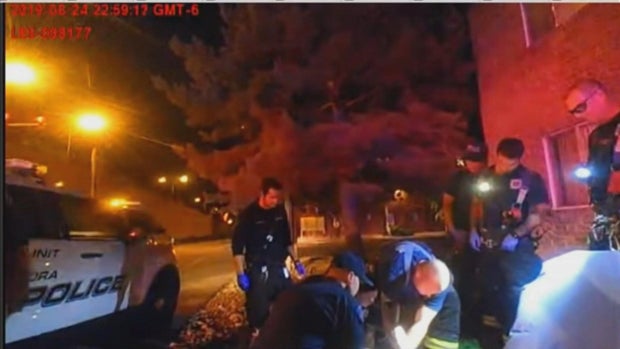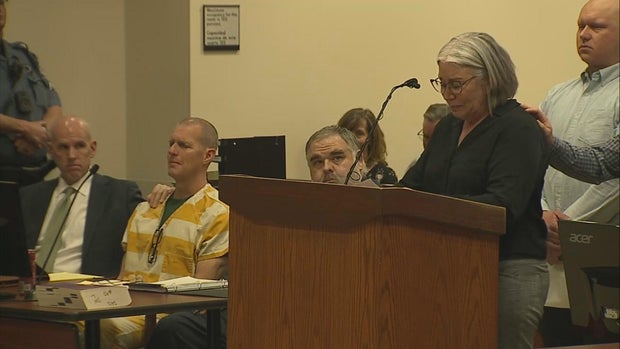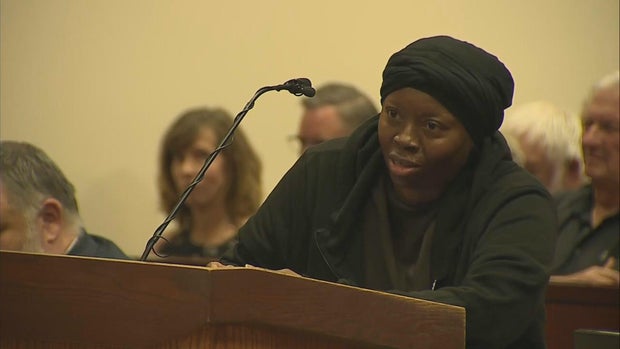CBS News
Former Colorado paramedic sentenced to 5 years after conviction in death of Elijah McClain
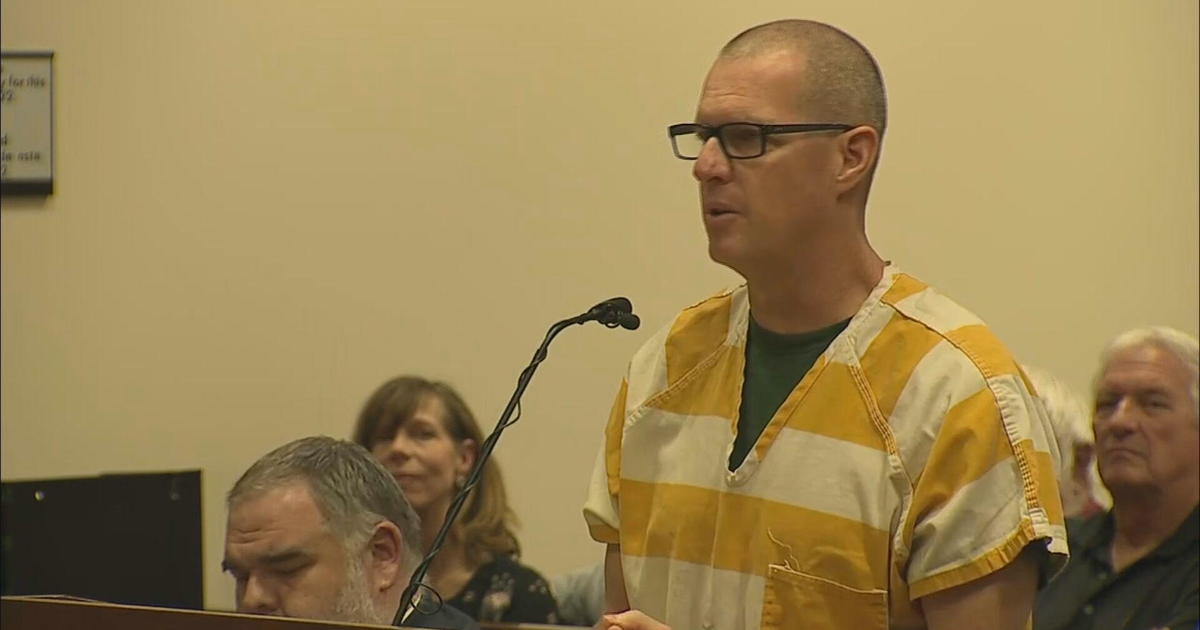
One of the two paramedics who were found guilty of criminally negligent homicide in the death of Elijah McClain was sentenced on Friday.
Former Aurora Fire Rescue paramedic Peter Cichuniec was sentenced to 5 years in prison — the minimum sentence — and 3 years of probation on Friday by Adams County District Judge Mark Warner. He said the sentence and the example it might send are tied to public safety, but also said he does not believe Cichuniec is a risk to the public.
McClain was walking home in August 2019 when the 23-year-old Black man was confronted by police officers who forcibly restrained him and then the Aurora Fire Rescue paramedics — Jeremy Cooper and Cichuniec — injected him with ketamine.
Aurora Police Department
He went into cardiac arrest in an ambulance a few minutes later and died three days after that.
Cooper and Cichuniec were both convicted on charges of criminally negligent homicide in December 2023.
Cichuniec was also found guilty of second-degree assault-unlawful administration of drugs, a conviction that typically carries a 5- to 16-year prison sentence. He appeared in court in a prison jumpsuit in handcuffs Friday.
CBS
Peter Cichuniec’s friends and family
During victim impact statements, several family members and friends spoke on behalf of Cichuniec.
Lainey Garrison, a friend and former neighbor of Cichuniec and his family, was the first to speak.
“Pete is one of the best people I know,” she said, her voice breaking. “He’s the last person that would have any ill intent or hatred toward anyone.”
Garrison said her kids grew up playing with Cichuniec’s kids and are a similar age.
His wife Katie Cichuniec and sons Jack and Ryan Cichuniec then stood together at the podium. His wife Katie said through tears that the approximately 100 letters of support of her husband received by the court don’t begin to speak to his character as a husband and father.
“Pete has always been my rock but never more than in 2021 when I was diagnosed with breast cancer,” she said. “He was at every single appointment.”
CBS
“He literally held me up and helped me walk when I was sick from treatment,” she continued. “That’s his character. He has never been cruel or intentionally hurt anyone with his actions or words.”
Jack Cichuniec, Peter’s 21-year-old son, said his father has been a constant source of inspiration and support amid a bone marrow disorder diagnosis.
“As an adult, I consider him one of my closest friends,” he said. “My dad consistently embodies the spirit of a selfless man, who I consider a hero.”
“I hope to be half the man, husband, father and citizen that he is,” he said, before requesting the judge impose the minimum sentence.
Ryan Cichuniec, Peter’s other son, said his father “was always there.”
“He’s an honorable man,” he said. “I would really appreciate you giving him leniency.”
Following statements from his family, fellow emergency medical professionals defended Peter Cichuniec and, at times, criticized the prosecution. One said the jury lacked understanding of the job of paramedics.
Peter Cichuniec then took the stand himself.
“I wish I could tell Ms. McClain that Elijah was going to be okay,” he said, just as he said he wished he could tell many loved ones of deceased victims in incidents he responded to. “But I can’t.”
CBS
“We can’t save everyone. I wish my mind could forget the things my eyes have seen over the last 18 years,” he continued. “Elijah will always be on my mind, along with all the others.”
He said he and his fellow paramedics never had the opportunity to go through video previously recorded by security cameras or police body-worn cameras, saying they had to make a “split-second decision” and didn’t have time to second-guess the police’s words at the scene.”
“I’m truly sorry for the loss of her son’s life,” he said of Sheneen McClain, Elijah’s mother. “I’m begging for mercy from the court.”
His attorney asked the judge for leniency in sentencing, including rehabilitation, saying there was no evidence that his client intended to hurt Elijah McClain.
Elijah McClain’s friends and family
Sheneen McClain spoke about her son during the victim impact statement portion of the hearing. She described having admired firefighters growing up until her son died at the hands of two paramedics.
“You cannot say you’re not training people to be robots when they find no fault in their actions,” she said. “I watched my son’s murder on bodycam video so many times because I want to know why they didn’t save him.”
CBS
Multiple times, Sheneen McClain characterized her son’s death as a “murder” and his detention by police and paramedics as a “kidnapping.”
“Elijah will never be a husband or a father,” she continued. “I have righteous anger toward those that made sure my son would never see another day.”
Sheneen McClain concluded: “Divine justice for my son, Elijah McClain.”
Jason Slothouber, one of the prosecutors, spoke about Elijah McClain’s personality, caring for everyone around him while trying to better himself. He characterized the killing as just one in a long line of unarmed Black men killed at the hands of police and other first responders and the shattering of trust between those responders and the public, both in Aurora and beyond.
He said Cichuniec knew he gave Elijah McClain too much ketamine and was the senior-most medical professional at the scene the night McClain was taken to the hospital.
After the judge ruled on the case, Colorado Attorney General Phil Weiser issued a statement, calling that sentence accountability for Cichuniec’s actions.
“No action will bring Elijah back or take away the pain and loss that his mother, Sheneen McClain, continues to experience,” he said, in part. “But today’s sentence from the court is one of accountability for the defendant’s criminal negligence in the death of Elijah McClain. It sends a strong message that no profession, whether a paramedic, a nurse, a police officer, an elected official, or a CEO should be immune from criminal prosecution for actions that violate the law and harm people.”
McClain’s death, investigation and other court cases
In Elijah McClain’s 2019 death, the coroner’s office in Adams County initially couldn’t determine how McClain died, but after social justice protests drew attention to the case, a medical examiner ultimately found that he died from complications of ketamine following forcible restraint. That led to a 2021 indictment of three police officers — Randy Roedema, Jason Rosenblatt and Nathan Woodyard — and the two paramedics.
Throughout their weeks-long trial, the use of the sedative that Cooper and Cichuniec injected McClain with and the amount given to him came under scrutiny. In 2018, Colorado state regulators had approved the drug for someone who was in an “agitated state” and showing signs of “excited delirium.” The defense for both men argued that was the case — that they were following their training by giving ketamine to McClain because he was showing an unusual amount of strength as he was being restrained and was acting in a strange way, they said.
Three officers from the Aurora Police Department have been tried in connection to McClain’s death. Last fall, two of the officers were acquitted in Elijah’s death and a third was found guilty.
CBS
A jury found Randy Roedema guilty of criminally negligent homicide and third-degree assault, while Jason Rosenblatt was found not guilty of manslaughter and assault in October 2023. A jury also found Nathan Woodyard not guilty of manslaughter and criminally negligent homicide in the 23-year-old’s death. Since the verdict, he has returned to the Aurora Police Department.
In January, Roedema was sentenced to 14 months in jail along with 4 years of probation. He has filed an appeal and is asking the court to review nine different aspects of the case.
The City of Aurora agreed in 2021 to pay $15 million to settle a civil lawsuit brought by McClain’s parents.
Cooper, the other paramedic who was convicted, is scheduled to be sentenced on April 26.
RELATED: Read all our coverage of Elijah McClain here
CBS News
Man kills self in explosions outside Brazil’s Supreme Court

A man who failed in an attempt to break into Brazil’s Supreme Court killed himself in explosions outside the building Wednesday that forced justices and staff to evacuate, authorities said.
The two strong blasts were heard about 7:30 p.m. after the day’s session finished and all the justices and staff left the building safely, Brazil’s Supreme Court said in a statement.
Local firefighters confirmed one man died at the scene in the capital Brasilia, but did not identify him.
EVARISTO SA/AFP via Getty Images
Celina Leão, the lieutenant governor of Brazil’s federal district, said the suspect had earlier detonated explosives in a car in a Congress parking lot, which did not cause injuries.
“His first action was to explode the car. Then he approached the Supreme Court and tried to get in the building. He failed and then there were the other explosions,” Leão said in a news conference.
Local media reported that the car that exploded belonged to a member of Brazil’s Liberal Party, the same of former President Jair Bolsonaro. Leão said only investigations will determine whether the owner of the car is the same man who died in the blasts.
Leão recommended that Congress be closed Thursday to avoid new risks. Brazil’s Senate heeded her call and the lower house will be shut until noon, speaker Arthur Lira said.
“It could have been a lone wolf, like others we’ve seen around the world,” Leão said in a news conference. “We are considering it as a suicide because there was only one victim. But investigations will show if that was indeed the case.”
Leão added only forensics will be able to identify the body, which remained outside the Supreme Court for three hours after the blasts.
The blasts outside the Supreme Court took place about 20 seconds apart in Brasilia’s Three Powers Plaza, where Brazil’s main government buildings, including the Supreme Court, Congress and presidential palace, are located.
President Luiz Inácio Lula da Silva was not in the neighboring presidential palace at the time, spokesman José Chrispiniano said.
Police blocked all access to the area and the presidential security bureau was conducting a sweep of the grounds around the presidential palace.
Brazil’s federal police said it is investigating and did not provide a motive.
The Supreme Court in recent years has become a target for threats by far-right groups and supporters of Bolsonaro’s due to its crackdown on the spread of false information. In particular, Justice Alexandre de Moraes has been a focus for their ire.
Lula’s spokesman said that late on Wednesday the leftist leader was gathering at the presidential residence with federal police chief Andrei Rodrigues, and Supreme Court Justices de Moraes and Cristiano Zanin.
CBS News
11/13: CBS Evening News – CBS News

Watch CBS News
Be the first to know
Get browser notifications for breaking news, live events, and exclusive reporting.
CBS News
What to know about Trump’s Department of Government Efficiency, led by Elon Musk and Vivek Ramaswamy
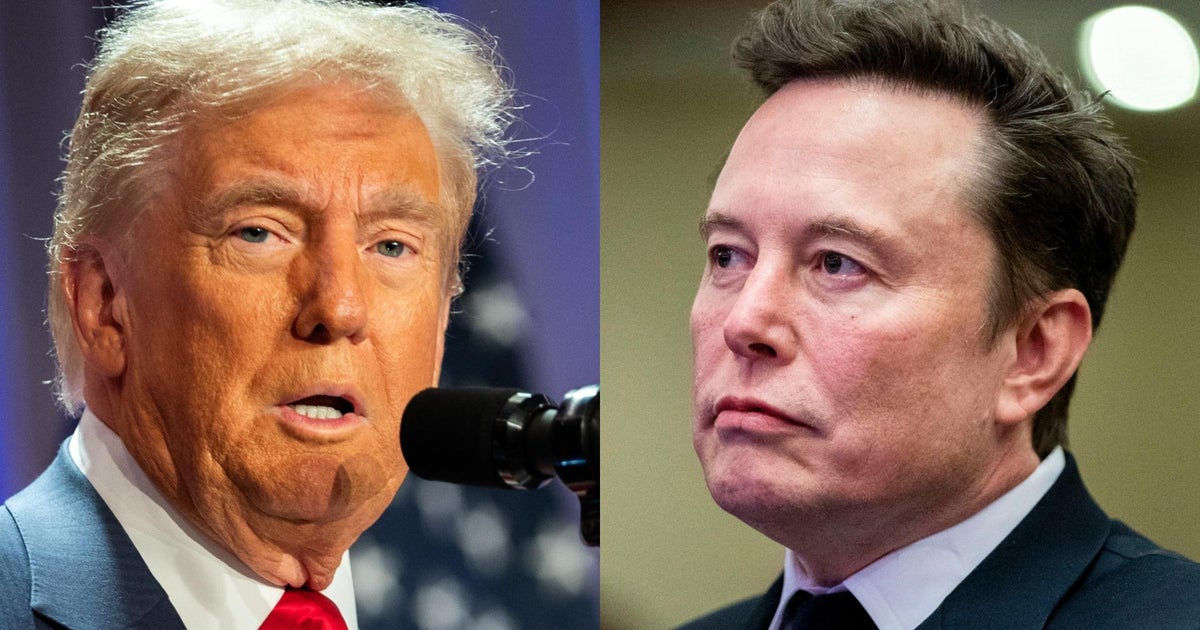
Donald Trump is vowing to reduce wasteful federal spending by tapping two billionaires — Tesla CEO Elon Musk and entrepreneur Vivek Ramaswamy — to spearhead the initiative, which the president-elect is calling the Department of Government Efficiency, or DOGE.
The appointments, announced by Trump on Tuesday, raise a host of questions about the effort, including whether Musk and Ramaswamy will have the authority to make changes in federal outlays, given that Congress authorizes the nation’s spending, as well as where the businessmen might look to cut spending. Under the plan, meanwhile, DOGE is not an official government department, raising questions about how its powers and how it will operate.
The announcement comes a week after Trump won a second term as president, with voters expressing their dissatisfaction with the economy under the Biden administration. As part of his campaign vows, Trump promised to slash government spending. Musk’s bio on X, the social media platform he bought in 2022, now reads, “The people voted for major government reform.”
“Frankly, it does need to be done again, so every few decades you really need to look at everything,” Elaine Kamarck, a senior fellow in governance studies at the Brookings Institution who managed the Clinton Administration’s National Performance Review, an effort to cut government spending in the 1990s, told CBS MoneyWatch.
But Kamarck also harbors reservations about Musk and Ramaswamy’s mandate, especially after the former recently suggested he could find more than $2 trillion in savings — almost one-third of the federal government’s $6.7 trillion in annual spending. Two-thirds of that spending is mandatory through programs including Social Security and Medicare, while discretionary spending is largely spent on defense.
“This is the first warning sign that this is going to be a failed operation,” Kamarck said. “That’s insane.”
The Trump campaign didn’t immediately respond to a request for comment.
Here’s what to know about the Department of Government Efficiency.
What is the Department of Government Efficiency?
Trump announced the DOGE in a statement on Tuesday, describing it as an effort to “slash excess regulations, cut wasteful expenditures, and restructure Federal Agencies.”
The name is a nod to Musk’s support for a cryptocurrency called dogecoin, which was created as a joke by two software engineers and uses the image of a smiling Shiba Inu dog. (Dogecoin has more than tripled in price during the last month, and now trades at 38 cents.)
Trump said Musk and Ramaswamy’s work “will conclude no later than July 4, 2026,” or by the 250th anniversary of the Declaration of Independence.
Trump only outlined the initiative’s contours and didn’t disclose how it will be staffed or funded. The Trump campaign didn’t respond to a request about the DOGE’s funding or whether Musk or Ramaswamy will be paid for their work on the effort.
Can the DOGE actually cut federal spending?
At the moment, that appears unlikely given that the DOGE isn’t a real government department, which would need to be created by congressional approval. Federal spending is authorized by Congress, and senators and House representatives may hesitate to support cuts to major programs like Social Security or Medicare, which are popular with millions of voters, or to the nation’s military.
It’s also not clear how the organization will operate. It could come under the Federal Advisory Committee Act, which dictates how external groups that advise the government must operate and be accountable to the public.
Trump described Musk and Ramaswamy’s role as providing “advice and guidance from outside of government.”
That doesn’t amount to much, Kamarck said.
“They have no authority — none whatsoever,” she added, while noting that the backing of the president can help convince lawmakers to throw their support behind efficiency efforts.
What have Musk and Ramaswamy said about federal spending?
Musk, the world’s richest person with a net worth of $319 billion, according to the Bloomberg Billionaires Index, has described the U.S. government as bloated and said it its spending is unsustainable. The Tesla founder also said he wants to reduce the number of federal agencies to 99, down from more than 400.
“There are so many [agencies] that people have never heard of, and that have overlapping areas of responsibilities,” Musk said earlier this month.
While on the campaign trail with Trump, Musk also said he could cut “at least $2 trillion” from the annual budget. “Your money is being wasted, and the Department of Government Efficiency will fix that,” Musk said.
Musk is known for cost-cutting at his own companies, slashing most of X’s workforce after he bought the business two years ago as well as focusing on manufacturing costs at Tesla. Even so, those efforts have had mixed results, with X’s valuation falling by about 80% since his purchase. Tesla’s stock price, meanwhile, has surged 48% in the past year, bumping its value above $1 trillion.
Ramaswamy, whom Forbes says has a net worth of about $1 billion, dropped out of the presidential race in January after running on an “anti-woke” campaign. He also advocated for government cuts by eliminating the Department of Education, a goal shared by President-elect Trump.
Have administrations previously tried to cut costs?
Yes, both Republican and Democratic presidents have created efforts to cut government spending.
In 1982, President Ronald Reagan created the Grace Commission, led by wealthy businessman J. Peter Grace, the CEO of W. R. Grace & Company, a chemicals business. About 150 business people volunteered for the commission, which ultimately recommended 2,500 reforms, according to the Ronald Reagan Presidential Library.
“Most of the recommendations, especially those requiring legislation from Congress, were never implemented,” the library notes. “However, the Commission’s work provided a starting point for many conservative critiques of the federal government.”
In the 1990s, President Bill Clinton created the National Performance Review with the goal to create a government that would work better and cost less, Kamarck said. The group was staffed with civil servants who understood the bureaucracy, and many of whom had frustrations with it, she added.
The group had some successes in streamlining operations and paring costs, eventually cutting more than 300,000 jobs, according to a study from the Congressional Research Service. Kamarck noted that the group also focused on integrating technology into departments at a time when the internet was just emerging, leading to efficiencies such as online tax filing.
Where could the Trump administration cut spending?
While experts are skeptical of Musk’s claim he can cut $2 trillion in spending, they also point out there are opportunities to look at efficiencies.
Eliminating Medicare fraud is one area that could result in savings, according to the Citizens Against Government Waste, a nonpartisan group that looks at government spending. Its recommendations also include reducing the nation’s contributions to the U.N. and ending subsidies for some agricultural products, like dairy and sugar. Its projected savings: $377 billion in the first year, or about 19% of the $2 trillion that Musk is eyeballing.
But efficiency goes beyond cost-cutting, Kamarck noted. It’s also about understanding how the bureaucracy works,
“Every single thing in the federal government is big and complicated, and there are layers and layers of complexity,” she noted. “Al Gore and I relied on hundreds of experienced civil servants to tell us how this worked — and if you don’t do this, which I suspect they won’t because Musk is an arrogant billionaire, you will fail.”
Does Musk have conflicts of interest?
Yes, as Musk’s SpaceX works with the Department of Defense and NASA, with the federal government pledging $3 billion to his companies last year, according to the New York Times. Tesla, meanwhile, has been investigated by the National Highway Traffic Safety Administration, as well as by other agencies.
Federal employees are generally required to disclose their financial assets and entanglements to ward off any potential conflicts of interest, and to divest significant holdings relating to their work. Because Musk and Ramaswamy would not be formal federal workers, they would not face those requirements or ethical limitations.
contributed to this report.


